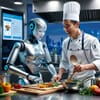Artificial intelligence (AI) is rapidly transforming the world of cooking by bridging the gap between culinary intuition and scientific analysis. AI systems are now capable of analysing large datasets of recipes, ingredients, flavour compounds, and nutritional profiles, thereby unlocking patterns and combinations that human chefs may not have considered. This shift allows cooking to evolve from purely an art of taste and tradition into a discipline enriched by data-driven insights and experimentation.
In practical terms, chefs and food technologists are using AI to generate entirely new recipes, customise meals to individual dietary preferences or health restrictions, and optimise ingredient combinations for flavour, texture and nutrition. These tools can suggest novel ingredient pairings, estimate the likely sensory experience of a dish, or even adapt classic recipes for sustainability, cost-effectiveness or regional availability. As a result, kitchens are becoming more like laboratories where creativity and computation co-exist.
However, the adoption of AI in the culinary domain also raises important questions. One challenge is preserving the human, cultural and emotional aspects of cooking—taste, creativity, tradition and sensory experience—that are hard to quantify. Moreover, there are concerns about over-reliance on algorithmic suggestions, loss of craft, and the potential for homogenisation of flavour if many kitchens lean heavily on the same data-driven models. Ensuring that AI supports rather than supplants human chefs is a key theme.
Looking ahead, the fusion of AI and cooking promises a more personalised, sustainable and innovative food system. From smart kitchens that monitor ingredient use and waste, to AI-driven menus tailored to individual health profiles, the next era of cooking may be defined by collaboration between human chefs and intelligent machines. Yet the ultimate success will depend on balancing technology with tradition, insight with intuition, and data with delight.


